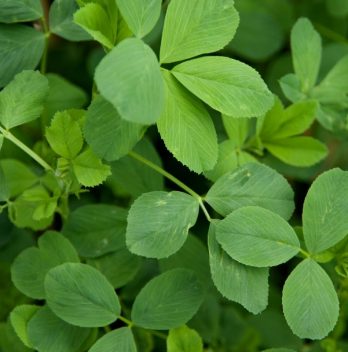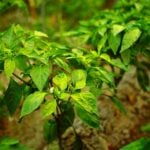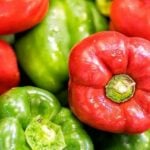Ever wondered if you can make use of an alfalfa meal in your garden? Alfalfa meal fertilizer can be used for other things but gardeners know there can be benefits from using it in their garden.
Alfalfa meal is a natural fertilizer that can be incorporated into your garden
If you are the one that likes to stick with organic fertilizer rather than synthetic fertilizer, then alfalfa meal is one natural fertilizer you can go for.
This natural fertilizer works great with different types of crops especially cole crops that include broccoli, cabbage, kale, Brussels sprouts, cauliflower, and so on.
The place of fertilizers cannot be underplayed in the growth of plants. With so many benefits this natural fertilizer offers; let’s look into what benefits our garden plants stand to gain using alfalfa meal fertilizer.
About Alfalfa Plant
Before we discuss the huge benefits of using the fertilizer, let’s mention a few things you should know about the Alfalfa meal:
Alfalfa is a richly leguminous perennial plant.
Derived by fermenting the adult seeds and plants of the plants.
The plant contains enormous nutritional benefits for other plants and
soil -dwelling organisms.Some of the major minerals which the plant may provide include Nitrogen, Phosphorus, Calcium, Potassium, Magnesium, Sulphur, Iron, Manganese, Boron Copper, Zinc, and other minerals In small proportions.
The alfalfa meal NPK analysis is 2.8-0.29-2.4, and it is an excellent addition to the compost pile for nitrogen. The fertilizer is entirely organic and non-GMO.
Used a great deal as a soil supplement. This is because it has the potential to re-energize the
soil potential and increase the organic composition of thesoil .

Can I Use Alfalfa Pellets As Fertilizer?
This alfalfa natural fertilizer can come in a meal or pellet for your garden use. The common type seen at the feed store is mostly the pellets. Use these pellets in your garden. All you need is to input a little extra work.
You can simply soak this pellet just to break them up. Then you get your resulting alfalfa meal.
Alfalfa For Garden: Alfalfa Meal Fertilizer Benefits
Using alfalfa meal in your garden as
Major Benefits Of Using Alfalfa Meal Fertilizer
Here are some of the major benefits of using alfalfa meal fertilizer in your garden.
1. Nutrients Provided To The Soil
Known for the great array of nutrients it offers to the
NPK Nutrient: Provides good NPK which is balanced. Can also help improve the
soil quality. The NPK is usually placed somewhere around 3-1-2.Vitamins: In addition to other nutrients, vitamins such as A, B, and E are also present in a reasonable proportion in the meal.
Minerals: So, minerals such as magnesium and iron are also present in substantial quantities in the meal.
Down to Earth Organic Alfalfa Meal Fertilizer Mix 2.5-0.5-2.5, 5 lb
So, the presence of this wide variety of nutrients makes for the potent nature of the fertilizer.
2. Multiple Purpose Use
The Alfalfa Meal fertilizer can serve multiple functions. Used as a mulch material, weed blocker, fertilizer for plants, and even as feed for livestock. The preparation of the Alfalfa plant may vary depending on the final purpose it is intended to serve.
3. Excellent Crop Cover
Another major benefit of Alfalfa is that it serves as crop cover. When planted, it usually grows very fast and covers the
4. Presence Of Triacontanol
One major benefit of this fertilizer is the presence of triacontanol. This is a naturally-occurring component that helps to promote healthy root development in plants. This component also helps in substantially improving the yield in crops. It also fixes the nitrogen content of the
5. Hold Moisture In The Soil
This fertilizer while absorbing much of its weight in water, it also holds moisture conveniently. Therefore, this aids the

6. Nematodes Suppression
The use of this fertilizer can also help in suppressing to a great proportion the amount of nematodes in the soil.
How To Use Alfalfa Meal Fertilizer
Now we understand the huge advantage that comes with using alfalfa meal fertilizers. Let’s get into how to properly use the fertilizer:
So, in heavy applications, use about 50 pounds for 1,000 square feet.
For a medium application, about 25 pounds should be used for 1,000 square feet.
In light application, about 12 pounds of fertilizer should be used for 1,000 square feet.
For the best possible result to be attained, the following should be noted when using the fertilizers:
Alfalfa meal fertilizer is an alkaline substance. As such, it should not be used for plants that do well with acid
soil .After the alfalfa meal has been spread on the desired potion of land, rake it into the
soil and water thesoil .The fertilizer is usually powdery and dusty. As such, a protective cover should be worn when it is being used to protect the face of users.
So, ensure to put leftover alfalfa meal in a good container to prevent mice from having access to it. Mice love the meal and putting it in soft bags would easily attract them.
FAQ’s
How long has alfalfa meal been used by farmers?
Alfalfa is a perennial legume that is very nutritious. The plant grows in the wild and has been cultivated for thousands of years. It was first domesticated by the Ancient Romans and its seeds were used as a food source and a fertilizer for crops. Alfalfa has been used by farmers for centuries because of its ability to improve soil quality and produce a high yield of nutritious, high-quality hay.
What are different ways that alfalfa meal is used?
Alfalfa meal is a byproduct of the processing of alfalfa and contains a high protein content. The protein content ranges between 25% to 45% of the dry matter. Alfalfa meal is used as a source of protein for livestock and poultry feed and as an ingredient in pet food. It is also used in the manufacture of plastics, detergents, and other products.
What plants benefit from alfalfa meal?
It can also be used to help keep weeds down and as a soil conditioner.
It is a great soil conditioner because of its nitrogen and phosphorous content. It is not as expensive as other feed supplements and is often used to help keep weeds down.
Plants like alfalfa meal. The roots of plants are made of mostly protein, carbohydrates, and minerals.
Alfalfa meal is used as a fertilizer for gardens, lawns, and farm land. It is commonly fed to livestock such as chickens, cows, pigs, and horses.
How do I use alfalfa meal as fertilizer?
Alfalfa meal is an excellent nitrogen source that can be used in many different ways. One of the easiest uses for alfalfa meal is to spread it on a lawn or garden to provide a slow release nitrogen source for your plants. You can also mix it with other fertilizers like liquid fish emulsion and add it to the soil around seedlings or young plants to help stimulate growth. Alfalfa meal is available at many feed stores or you can buy it online.
When you are using alfalfa meal as a fertilizer, you will want to spread it on top of the soil and not directly on the plants themselves. This is because alfalfa meal is not a plant food. It is more like a slow release nitrogen source than a true fertilizer. It is also not good for your lawns or gardens if you use it this way. You should only use alfalfa meal as a fertilizer when you want to encourage growth in your plants. If you do decide to use alfalfa meal as a fertilizer, make sure you spread it correctly. There are a few different ways to do this depending on the type of fertilizer you are using. If you are using a granular fertilizer, mix it with water and then spray the mixture onto the soil surface.
Conclusion On Alfalfa Meal Fertilizer Benefits
There is a need to use a supplement to improve plant growth and
There is a wide array of benefits that the use of this fertilizer can give to the
So, make sure to observe some of the key guides on how to use and apply this fertilizer.






